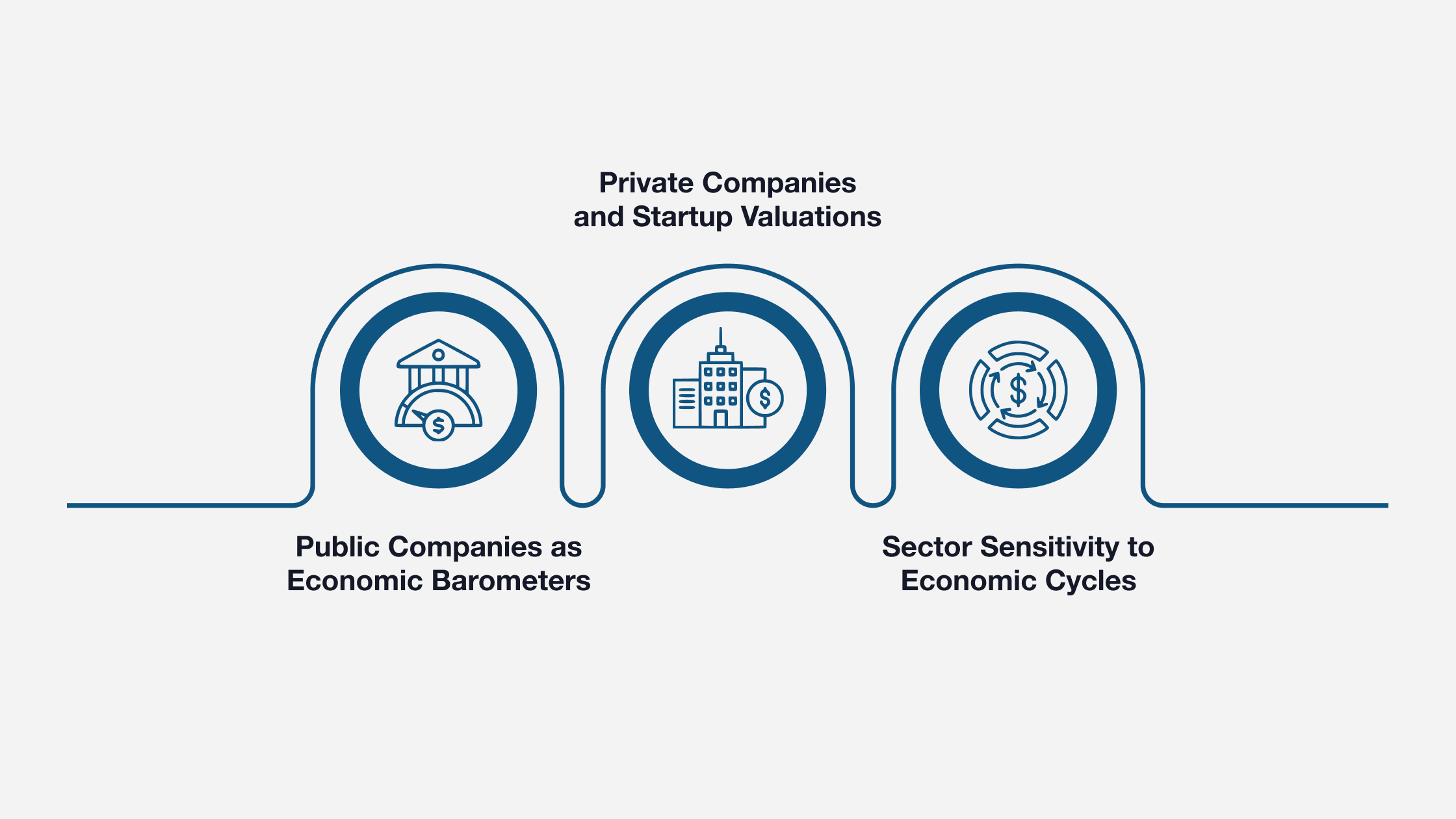Given today’s dynamic marketplace, business valuations can vary significantly from year to year and company to company, even within the same industry and between businesses at the same stage of development.
Whether a startup is securing its first round of funding, an established small business is preparing for an exit, or a publicly traded company is releasing quarterly earnings, a business’s valuation is always carefully scrutinized by potential investors. But how closely does a business’s valuation reflect what’s happening in the overall economy? The answer is that it depends!
In this blog, we will discuss the factors that drive business valuations, their correlation with broader economic indicators, and the circumstances under which valuations can become decoupled from economic conditions.
What is Business Valuation?
Business valuation is the process of determining a company’s economic value at a specific point in time. A business can be valued using several different approaches, including:
- Discounted Cash Flow (DCF): A valuation approach that projects a business’s future cash flows.
- Market Comparables: A valuation approach based on the price of similar companies.
- Asset-Based Valuation: A valuation approach derived from the net assets owned by the business.
- Earnings Multiples: A valuation approach using price-to-earnings (P/E), EBITDA multiples, etc.
Each method primarily considers internal metrics within the business’s control, such as revenue, profit margins, growth rate, and operational efficiency.
The Economy’s Role in a Business’s Valuation
Economic factors, such as interest rates, inflation, employment levels, GDP growth, supply vs. demand, and consumer confidence, can also impact valuations, as these factors affect investor sentiment, capital availability, consumer demand, and cost structures. For instance:
- Low interest rates generally lead to higher valuations, because expectations for profits increase and future earnings are, consequently, discounted less aggressively;
- Economic expansions are often the result of increased consumer spending, which boosts revenue projections and valuation multiples, but
- Recessions or economic uncertainty can compress valuations due to risk aversion and lower growth expectations.
The Correlation Between Business Valuation and the Economy
Understanding the following patterns helps owners and investors anticipate how valuations may shift.
1. Public Companies as Economic Barometers
Many public companies, particularly those in the consumer goods, retail, and industrial sectors, closely mirror their economic performance. When consumer confidence is high, companies like Amazon or Walmart typically report better earnings, which in turn lifts their valuations. This makes large-cap indices, such as the Dow Jones Industrial Average and the S&P 500, a reliable indicator of economic trends.
2. Private Companies and Startup Valuations
For startups and private firms, valuations are more sentiment-driven. In bullish economies, venture capital flows freely, often leading to inflated valuations based on projected future growth rather than proven revenue models.
3. Sector Sensitivity to Economic Cycles
In bull markets, valuations tend to rise due to optimism and easy access to credit, whereas in bear markets, risk aversion and tighter credit conditions compress valuations. However, some industries are more sensitive to economic cycles than others. For example:
- Industries with high valuation swings, such as tech and biotech, are particularly prone to significant valuation fluctuations due to innovations and regulatory changes.
- Industries with low valuation swings include Manufacturing and utilities, which are more predictable and typically have narrower valuation ranges.
- Cyclical sectors, such as the automotive, real estate, and luxury goods industries, experience fluctuations in valuations that mirror the economy’s ups and downs.
- Defensive sectors, such as healthcare and utilities, tend to show more stability, even during downturns.
So, how a specific business’s valuation correlates with the economy can also depend on its industry.
What Happens When Valuations Diverge From Economic Reality?
Business valuations are often influenced by economic and market cycles. That said, there are notable periods when business valuations and the economy appear to be disconnected. For instance:
- The period following the pandemic-era stimulus: In 2020, many companies experienced growth in valuation despite a global decline in GDP.
- During tech booms: Valuations soared despite broader economic instability, as seen during the dot-com bubble, the tech surge in 2021 and 2022 following the COVID-19 pandemic, and more recently due to the rise of AI.
- Liquidity-fueled markets: Central bank interventions and quantitative easing can prop up asset prices regardless of economic output.
Such divergences are often unsustainable, however, leading to corrections when fundamentals catch up.
Practical Ways to Evaluate How A Business’s Valuation Correlates With The Economy
To assess how closely a business’s valuation aligns with the economy, consider the following factors:
- Comparable Growth Rates: Is the business growing faster or slower than GDP?
- Market Multiples: Are the business’s P/E ratios historically high or low for the sector?
- Capital Flows: Are investors Favoring Risk or Seeking Safety?
- Macro Indicators: Inflation, interest rates, regulations, and consumer confidence all offer insights into valuations. How are these factors impacting the business’s valuation?
- The Business’ Stage of Development: Startups are usually valued based on their growth potential, where mature businesses’ values are more heavily influenced by the business’s financial history and predictable cash flows.
- Intangible Assets & Intellectual Property (IP): Businesses with strong brands, proprietary technology, and/or intellectual property command higher valuations.
- Management & Execution Risk: Investors may value two similar businesses differently based on their perceptions of the leadership team, the business’s strategy, and/or the CEO’s track record of execution.
- Investor Psychology: Investor sentiment can drive significant discrepancies in valuations, especially in private markets. Hype, “fear of missing out” (“FOMO”), or “herd behavior” can inflate or deflate valuations irrespective of a business’s fundamentals.
Position Your Business for the Future with Certified Consultants from IEPA
Both internal performance and external economic forces influence a business’s valuation. While valuations often correlate with financial health, there are frequent periods of disconnect due to investor sentiment, monetary policy, industry, the business stage of development, or speculative trends.
Knowledgeable investors and business leaders understand the nuances behind valuation. Certified Business Exit Consultants® (CBECs) can help demystify the concept of business valuation and guide you about the type and frequency of business valuations for your business when planning your exit.
Find a Certified Business Exit Consultant® Now!
About the Author:
James J. Talerico, Jr. CMC ® CBEC ® is an award-winning author, blogger, speaker, and a nationally recognized small to mid-sized (SMB) business expert, with outstanding business consulting, succession planning, value acceleration, and exit planning credentials. He is the owner of Greater Prairie Business Consulting, Inc. (www.greaterprairiebusinessconsulting.com) located in Irving, Texas and has helped thousands of business owners throughout the US and in Canada maximize their business performance and exits for more than 30 years. Jim currently sits on The IEPA’s Education Committee.






